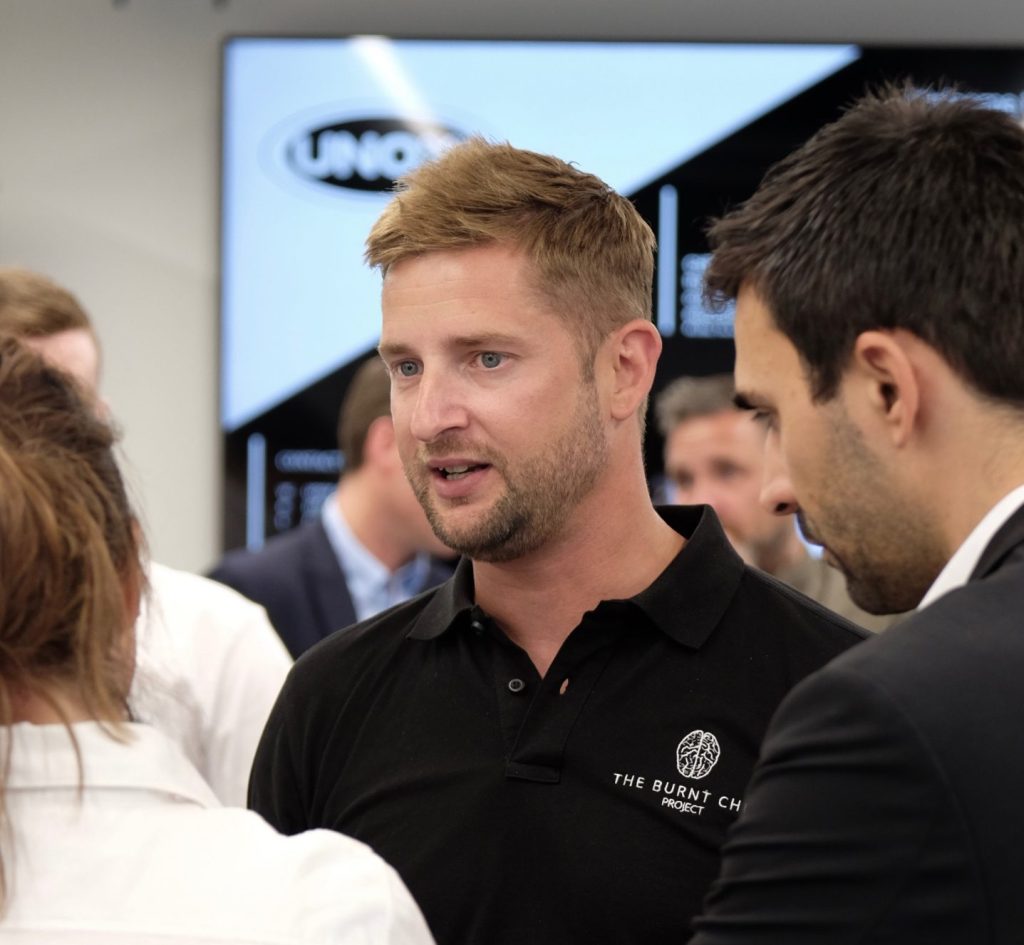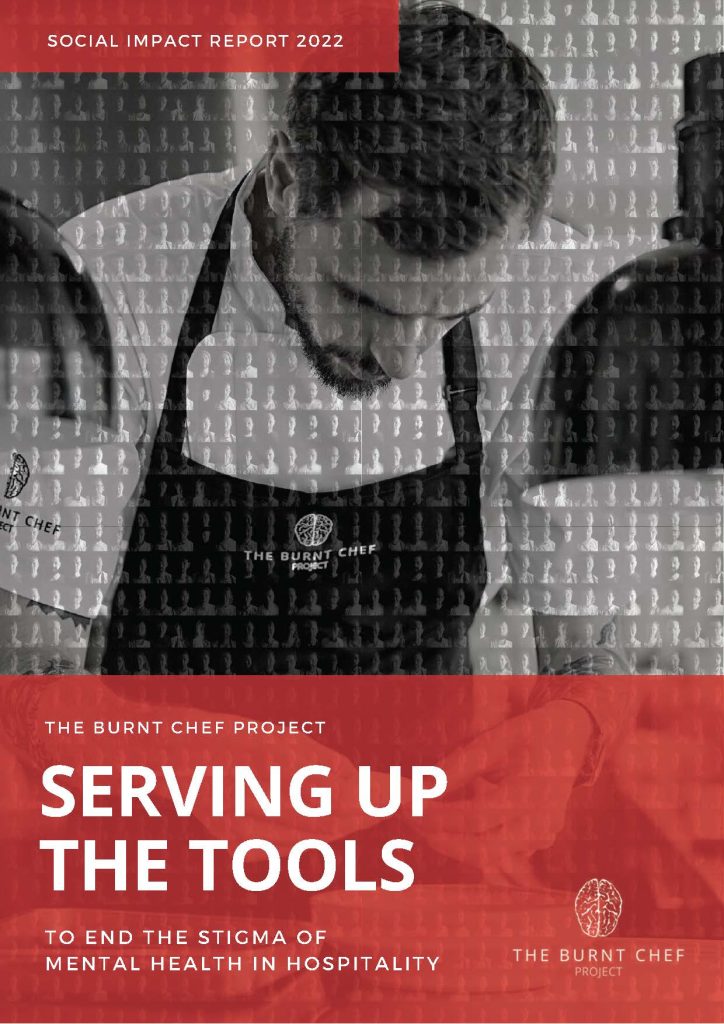Kris Hall set up The Burnt Chef Project in 2019 to raise awareness for mental health issues within the hospitality industry. Here he starts a conversation about the importance of supporting your teams and, crucially, how to get help
From your perspective, how do you see the mental state of our hospitality industry?
There are two sides to consider: the emotive side, the side that we see and we feel, versus what the data shows us. It’s important to say that hospitality is the best job that anyone can have, it is the best profession, the best opportunity for travelling the globe and meeting new people, learning new skills and developing your career path. What we have to acknowledge is that we are in very difficult times in terms of Covid, increased use of digital technology and pressures on the economic climate whilst also working in a very high-pressured, high-demand industry. With that in mind, I think it’s perfectly normal for us as an industry to experience a higher rate of mental illness than other sectors. And to put this into context, based on studies that we’ve done, four out of five hospitality professionals will have, or have, experienced one mental illness during the course of their career. When you compare it to the NHS standard of one in four, it shows that high-stress environments, fast-paced, high-demand environments, can exacerbate mental health issues.
Working in hospitality isn’t always the cause of those mental health issues, is it?
No, and it’s important to recognise that, but when you’re in an environment that has all of those elements to it, it gives you very little time to regulate and manage your own mental fitness. Things are improving, and employers are looking more into how they can support their team members, but we’re a very reactive industry, we’re great at being able to fix problems when they go wrong. We instantly say yes to that sudden walk in of 30 people, because we want to help. But we’re starting to see businesses, over the last year or two, move beyond that reactionary phase and ask, how can we start to improve staff wellbeing?
How can operators be more proactive when it comes to tackling wellbeing?
First and foremost, all employers have a duty of care to their employees under UK law, but there is something that is often missed – and which should not be underrated – and that is a workplace stress risk assessment. This is a legal requirement in line with the Health and Safety Executive (HSE) for every single employer in every single sector to have, but we don’t tend to see it that frequently. And it’s not that heavily regulated. Now, does that mean that people can get away without having one? That’s up to them. But, ultimately, the benefits that it has to their business in an industry that experiences higher than normal stress levels shouldn’t be underestimated.
How does an operator go about creating a workplace stress risk assessment?
A workplace stress risk assessment is completely free. All you need to do is go to your team and say, ‘Hi, guys, in terms of demands, what is it that puts stress upon you and how does that impact your working day? What’s your role clarity like? What do we do in terms of supportive systems and where does that lack of support cause stress?’ Based on having that open dialogue with individuals, you can start to build together a risk assessment, and then you can look at what areas you do well in and what you could do better in. Having your team’s involvement in that allows them to buy into that journey, into that improvement of that internal cultural process.

Do you see a difference in those operators who nurture their team’s mental health?
Yes, it’s massive. We run workshops where we sit down with the executive team, the middle management team, and the everyday people who are working at the fryers or as KPs, and we say nothing is off the table here, everyone speak their minds. What is it about your day that causes you stress and that distracts you from your work?
Something we hear in these sessions more and more frequently since Covid is my shift patterns don’t work with my family life and that causes me stress and anxiety. As an employer, you’ve got two options. You can either go, ‘Well, that’s hospitality, like it or lump it’, or you subscribe to our way of thinking, which is, ‘Okay, I understand that that will have an impact, how can we make the adjustments that work well for our business, and work well for you?’ Because if staff stay happy, they will work for you for longer and your customers will be happier. So by having these workplace stress risk assessments, these open dialogues where people feel safe to discuss these things, we can start to create environments that tackle those higher than normal rates of mental illness.
What support services does The Burnt Chef Project offer?
We have a multitude of different services, we break them down into different pillars. So we have services such as our podcast, with over 100,000 downloads, which is full of leadership, mental health awareness, and culture conversations with people from all different walks of life, and our merchandise, which is now in 78 countries and starts conversations everywhere. And then we have supportive systems. So we have our free 24-hour text-based support number where day or night someone can text us and they will get through to a trained volunteer, even at four o’clock in the morning. It is a listening peer support service and they’ll just listen and allow you to be heard in a moment where perhaps you just need that stranger to speak to. We also have paid for services, such as our NHS top-up plan which pays people for going to see the doctor, and pays for their prescriptions, glasses and private medical cover by way of cashback into their account within seven days. We also have our Thrive mental well-being service, which is an app that allows people to get hold of a therapist within less than 10 minutes.
A therapist in less than 10 minutes is unheard of, isn’t it?
I know. After the triage, you’ll be put into a queue for unlimited, regular therapy sessions within about two weeks. And what happens with that is that we’ve seen recovery rates of around about 75%. So people who use that service are finding that they’re actually recovering and getting better.
That’s really positive because I think, we can all agree, that staffing is one of the biggest issues in our industry at the moment
Yes, exactly. Deloitte, do a wellbeing survey on the whole of the economy and they have predicted that 40% of all work-related illness and turnover is a direct result of mental illness. And the HSE say that over 50% of all work-related illness are a direct result of stress. So, if you think about those numbers for a second, and you understand that, even in hospitality, your average turnover rates are anywhere between 80 to 125% and you can cut that, let’s be generous and say by a third, by having the right supportive systems in place, you will find that actually less of your profit is walking out the door. As an operator, you start to get that regularity of experience, that good customer service level, that good culture, and that feel-good factor within the organisation, which ultimately will lead to a higher rate of performance and better operating profits.
I think any operators reading this should ask themselves how much of their time is spent finding, advertising and recruiting for the right people. How long are those people staying in your business? And why are they leaving? If we can start to get the right support structures, the right induction plans, and the right culture in place, then what else could you do with all of that time?

What tips would you give to an operator looking to support their team’s wellbeing?
The first tip is to assess where you are currently. Go out, speak to the teams, the teams will give you the information that you need in order to be able to put a strategy together. There is no magic wand and each organisation is very different. But by speaking to people, you’re going to be able to find out if people feel supported, whether they are struggling with their mental health and wellbeing, and what additional support and in which areas they need help. Based on that, you can see where to focus. I think every single employer should have at least basic mental health awareness training. We offer training, it’s only three hours, but it’s aimed at improving the skill sets around starting a conversation and signposting in mental health and mental illness.
Operators should also look at support mechanisms. And this isn’t a sales pitch, if you want to recover people and give them access to unlimited therapy and wellbeing tools, then by all means pay £5 per person per month for Thrive. But you don’t have to, you can use our free support systems. And we should not underestimate the power of just being able to start a conversation and giving someone access to a conversation at three o’clock in the morning. And the same with education. In line with a government campaign at the moment in terms of suicide prevention, we have three modules – which are available for free through our website – on how to identify and support someone who may be experiencing thoughts or feelings of suicide. We have modules that deal with sleep and nutrition as well as a 36-page guide on how to do a stress-free workplace stress risk assessment. Again, it’s all free, all on our website. People can start there and see how they go.
How did The Burnt Chef Project come about?
Seven or eight years ago, I hit rock bottom with my mental health and this wasn’t as a result of hospitality. It was a result of something that happened back in my late teens. I’m 36 years old and I had been carrying that around for a while. When I finally tried to access help, I was very surprised at how difficult it was to be able to have this conversation and the sense of shame and guilt around this. At the time, I worked supplying chefs in restaurants all around the southwest and when I came out of recovery and started speaking to people about this, there was the same sort of response, which was, we can’t talk about this because it’s going to harm our career or we can’t talk about this because it’s not the done thing in our sector. I said, yes but it has been so powerful for me to be able to access the help and have this discussion and I think that it could help this industry. That was back in May 2019 and we’re now a global movement, we’ve helped thousands of individuals with their mental health, and trained thousands more, from students in the catering colleges all the way up to CEOs of organisations, in mental health and wellbeing awareness.










